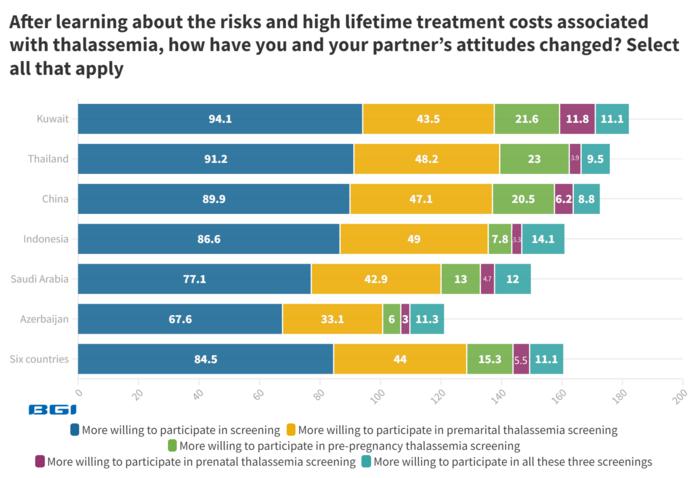According to Thailand’s Ministry of Public Health, approximately 18-24 million or 30-40 percent of the Thai population carries the thalassemia gene, with moderately severe thalassemia patients requiring regular treatment, including blood transfusion and chelation therapy to remove excess iron from the blood.

Credit: BGI Genomics
According to Thailand’s Ministry of Public Health, approximately 18-24 million or 30-40 percent of the Thai population carries the thalassemia gene, with moderately severe thalassemia patients requiring regular treatment, including blood transfusion and chelation therapy to remove excess iron from the blood.
To facilitate greater understanding of this hereditary hemoglobinopathy, BGI Genomics released its State of Thalassemia Awareness Report. This report assesses the level of knowledge and attitudes related to the associated health risks, thalassemia carrier screening, and genetic counseling for carriers. 1,847 female respondents from six countries with high thalassemia prevalence were surveyed: Azerbaijan, China, Indonesia, Kuwait, Saudi Arabia, and Thailand.
If both partners are thalassemia carriers, 72.5% of Thai women can persuade their partners to seek genetic counseling and consider preimplantation genetic diagnosis (PGD), which is higher than the global average of 50.8%. Thai (91.2%) women consider screening after learning about associated thalassemia health risks and costs, which is higher than the global average of 84.5%.
Survey findings highlighted the urgent need to improve awareness, address barriers, and enhance access to screening:
Most don’t know much about thalassemia: 70.5% of women did not know much about thalassemia symptoms and the associated health risks, with another 14.4% indicating they never heard about thalassemia. The proportion of women who knew little about thalassemia does not vary significantly with age or marital status.
Greater willingness to undergo thalassemia screening with more information: After learning about the health risks and high lifetime treatment costs associated with thalassemia, 84.5% of women are more willing to undergo some form of thalassemia screening (premarital, pre-pregnancy, and prenatal tests).
Accessibility matters: Hospitals or agencies nearby that provide screening services (43.1%), cost of screening services (38.1%), and before getting married or having children (35.3%) are the top reasons that affect the willingness to undergo thalassemia screening.
Thalassemia carriers are more open to genetic counseling: If both partners are thalassemia carriers, 50.8% of women can persuade their partners to seek genetic counseling and consider PGD. If women have obtained information about thalassemia from health awareness programs, this percentage rises to 59.5%.
Dr. Zhiyu Peng, BGI Genomics Deputy GM, notes, “This survey shows that enhancing awareness and accessibility are an important first step in thalassemia control programs. Region-specific screening and treatment programs, customized to align with local healthcare resources and cultural values, are also vital to identify thalassemia patients and carriers.”
Dr. Androulla Eleftheriou, Thalassaemia International Federation Executive Director, comments, “Enhancing awareness is a crucial first step in promoting individual behavior changes and policy reforms, ultimately leading to improved prevention, control, and management of thalassemia. Screening services – a key component of any effective national control programme – needs to consider cultural and socio-economic backgrounds. We welcome BGI Genomics efforts and reaffirm our commitment to further expanding thalassemia awareness on a global scale.”
To read the full report, please click to access the BGI Genomics State of State of Thalassemia Awareness Report 2023.
About BGI Genomics and thalassemia screening tests
BGI Genomics, headquartered in Shenzhen, China, is the world’s leading integrated solutions provider of precision medicine. In July 2017, as a subsidiary of BGI Group, BGI Genomics (300676.SZ) was officially listed on the Shenzhen Stock Exchange.
The company has pioneered thalassemia genetic testing services based on next-generation sequencing (NGS) technology since 2013. Expanding the availability of genetic testing has been instrumental in the screening, diagnosing, and treating thalassemia.




